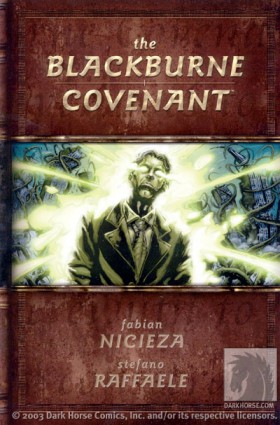| The
Blackburne Covenant
It’s
always amazed me how very close our fictions come to being
our realities. For every story ever written about a tragic,
Romeo-&-Juliet-esque romance, there is an equally tragic
“real life” story about two kids who made a
suicide-love pact. History itself is rarely based completely
on facts, but on extrapolations from actual facts, myths,
and sometimes-outright heresy from historical figures or
documents. Depending on your historical perspective, Alexander
the Great was a land mongering bastard or a man of intellect
who strove to preserve the cultures of conquered lands while
forming an empire.
The
fictions we create become just as much a part of our world
as the hard facts that make up our history, and affect the
world in equal ways. This blurring-of-the-line dividing
fiction and history is very much at the heart of Dark Horse
Comic’s The Blackburne Covenant by Fabian
Nicieza and Stefano Raffaele.
Richard
Kaine has finally written something worth publishing. Wintersong,
his first novel about a group of earth mystics who are crushed
by a covenant of medieval Barons and landowners, is #1 on
the New York Times bestseller list, and garnering acclaim
from critics and fans alike. In fact, so many find the story
so captivating that people are clutching at conspiracy theories
stating that the book might well be historically accurate.
Which is funny to Richard Kaine, the man who made it all
up.
Or did
he?
In the
face of trying to write his next book, and failing drunkenly
at the task, Richard begins to see the world in a different
light: namely a green and somewhat glowing light, where
living beings from flora to fauna glow with strange colors.
What’s more, a man who wears the mark of Richard’s
fictitious antagonists, The Blackburne Covenant, attacks
Richard and escapes. Suddenly, the world is getting weird,
and Richard is having a hard time deciding whether Wintersong
is the ramblings of an active imagination, or his own memories
come back to haunt him. And he’ll have to decide quick,
or end up dead…literally and literature-ly.
I’d
never read Fabian Nicieza’s work before this miniseries,
as most of what I remember his name appearing on were various
titles from the early 90s like X-Force and New
Warriors, neither title being something I cared to
buy. I’m glad I didn’t, because I’m almost
sure I would have been biased against him for ever asking
the comic reading community to take a superhero named “Speedball”
seriously.
Nicieza’s
work here is really good. He writes Richard in a complex
way, but gives the reader no indication of Richard having
to fit any role. He is not heroic, nor is he malevolent.
He’s just Richard, and by creating a character that
has no literary archetype, Nicieza forces the reader to
not label him. It makes him an unpredictable character.
Also, Richard is intransigent threw most of the book; things
happen to him, he doesn’t cause them. He kind of cruises
down the path that most easily presents itself and never
really shows a willingness to affect his world until the
fourth act.
Normally,
I would malign the writer for making a character so beholden
to the plot of the story, but the idea that a man can be
living a story is a theme that runs throughout the book,
and the fact that he begins to shape his destiny towards
the end shows that the character has changed, especially
in the creative way that he devises to “save the world.”
Also,
the idea of fiction and history being related is felt all
through the story. Nicieza demonstrates that in the way
he will seamlessly transfer from modern day scenes with
Richard to the fictional scenes involving his Wintersong
protagonist Talinada. Her story feeds into the meta-text
of the whole graphic novel, highlighting transition points
for Richard as his character changes, along with his view
of the world. Talinada is as much a character as Richard
in the way the reader gets to see her story unfold in the
past tense, as Richard becomes aware of his ties to Talinada.
The
artwork is most excellent. I’ve also never seen anything
from Italian horror artist Stefano Raffaele, and was just
as impressed with his art as Nicieza’s writing. His
drawing style seems like a more angular and less clean Dustin
Nguyen, with a good understanding of using shadows to create
just a touch of tension in the panels. He also throws in
some subtle references to the divine; one appearing right
at the beginning during a crucifiction scene. His faces
are sometimes cluttered with too many facial lines, but
this is mostly done on throwaway characters that are only
meant to be the Red Shirts of the comic, so there’s
nothing lost in that respect. I especially like his lighting
effects and the warped reality shots from Richard’s
perspective. He can make a tea bag look interesting through
the cunning drawing of power flares and such. I was especially
impressed by one series of panels, where Richard hallucinates
while looking at the empty lot that used to be Ground Zero,
and sees the World Trade Center spring back to life, this
time covered in green and expanding to cover the city. Raffaele
draws his people as well as his architecture.
This
is a damn good comic and well worth the $12.95 price tag.
And it’s nice to see the long forgotten art of the
miniseries is not totally gone from comic store racks, lost
somewhere in the bustle of maxi-series and three issue wonders
that seem par for course today. Pick this book up, and you
won’t regret it. Just remember: powerful mystic magic
users is fiction; crazy guy alone and naked in the woods
trying to summon rain…a sad but true reality.
The
Blackburne Covenant
|






